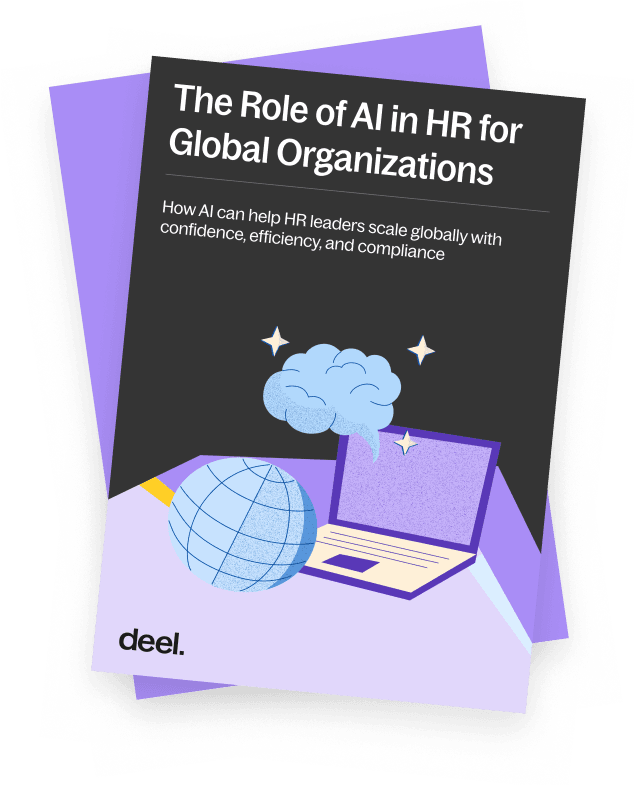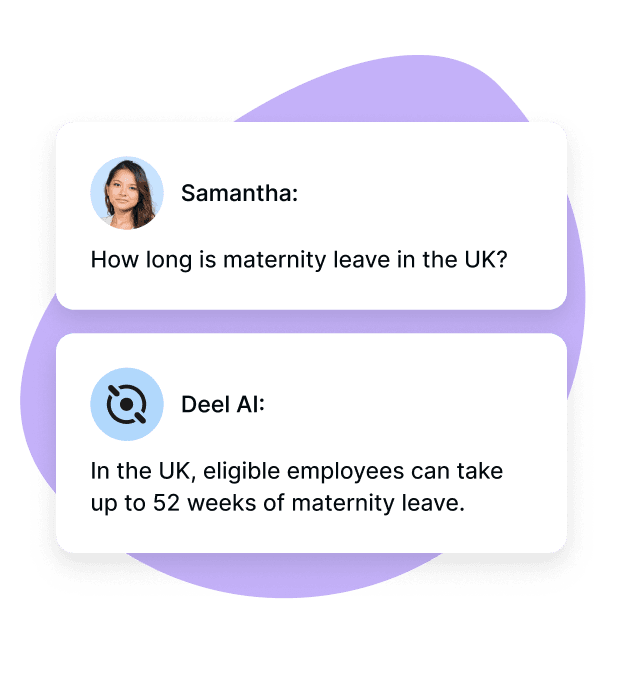Article
6 min read
Will AI Help or Hurt Age Bias in Recruitment?

Author
Alan Price
Last Update
July 16, 2025

Table of Contents
Is ageism still an issue for UK recruiters?
What is AI’s role in combating ageism in recruitment?
What’s the answer for AI-driven HR teams?
Beyond recruitment: AI’s impact on ageism in the workplace
About the author
Alan Price serves as the Director of Talent Acquisition at Deel, overseeing talent acquisition teams in the US, LATAM, EMEA, and APAC regions. Before joining Deel, Alan was a founding member of the micro-mobility company Dott, where he held the position of Vice President of People. Prior to his role at Dott, he held senior positions at Uber and Google.
Age diversity can be a powerful asset for any organisation, allowing them to benefit from a broader range of perspectives, problem-solving approaches, and lived experiences. But despite a growing awareness among HR professionals about the value of multigenerational teams, age-based discrimination remains prevalent in the UK labour market, particularly against those over the age of 50.
Simultaneously, AI is helping HR teams find new solutions to old problems, and many teams are already implementing AI to help streamline recruitment. What we should now be asking is – will AI hurt efforts to combat ageism, or could it be part of the solution to it?
Is ageism still an issue for UK recruiters?
Unconscious biases are tricky to root out, and unfortunately, the UK labour market is still struggling to tackle ageism:
- Studies show that one in four people in the UK have experienced ageism at work.
- 15% reported that they felt their age directly affected their success in job applications.
- It’s not just about fairness and equity. Ageism could reportedly lead to £138 billion in lost economic output in England and Wales alone this year.
Harmful stereotypes impact the success of workers at both ends of the age spectrum. Younger workers, especially Gen Z, are labelled lazy and overly sensitive, while older workers are thought to be out of touch or less relevant. However, upon examining the data, we see that older individuals are disproportionately bearing the brunt of ageism when it comes to hiring.
- A shocking 81% of individuals surveyed over the age of 50 report that their chances of securing a job have diminished due to age.
- 25% of those over the age of 50 admit that the fear of age discrimination has deterred them from job hunting.
- Their fears are not unfounded. One in four people believe it isn’t good business sense to hire someone over the age of 50, believing they’ll be slow to adapt.
With the UK now officially classed as an ageing population, eliminating ageism from recruitment is now more important than ever. If we can harness the power of AI to achieve that goal, we should.
Complementary reading
Deel AI
What is AI’s role in combating ageism in recruitment?
In conversations about the impact of AI on ageism, some basic arguments for and against emerge:
The case for AI as a solution:
- Objective screening: AI can be programmed to ignore age-related indicators, such as graduation year or extensive career gaps, focusing instead purely on skills, qualifications, and relevant experience. Automated screening systems can apply the same criteria to every candidate, reducing the inconsistencies that often allow age bias to slip through the cracks in manual screenings.
- Auditability: When designed correctly, AI decision-making processes can be meticulously documented, offering a clear audit trail for transparency and easier reporting on fairness metrics.
- Bias detection: AI can help monitor for systemic patterns of age bias across recruitment processes. By analysing large datasets, AI can highlight disparities in shortlisting, interview rates, or offer decisions across age groups, flagging areas where intervention is needed.
The case against AI as a solution:
- Biased training data: A significant concern is AI's potential to perpetuate systemic biases, including ageism, if trained on historical data that reflects past discriminatory hiring patterns.
- Reduced human oversight: Over-reliance on automation can disadvantage candidates with unconventional or non-linear career paths, which AI algorithms may struggle to interpret accurately. Furthermore, some AI tools that analyse non-job-related characteristics like voice or facial expressions have been found to introduce biases.
- Black box risk: Some AI systems operate as "black boxes," making it difficult to understand how decisions are reached or to identify if age played a role in a candidate's rejection, hindering accountability.
AI is neither inherently helpful nor harmful to anti-ageism efforts. It doesn’t come with its own morals and biases, and instead inherits those of its creators. Its impact hinges entirely on how these powerful technologies are designed, implemented, and continuously managed. So if our goal is to minimise bias in recruitment, we must do so intentionally.
The stakes are high, and compliance with AI regulations is not to be ignored. In a well-publicised lawsuit from the US, a 40-year-old man claimed his almost 100 job applications were automatically rejected, often within minutes or during the night, suggesting a complete lack of human oversight. This landmark case underscores the critical need for systems to be proactively designed with anti-ageism principles at their core. Companies that ignore that need risk reputational damage and costly fines.
What’s the answer for AI-driven HR teams?
AI is only as ethical as the people wielding it. Therefore, any effective anti-ageism strategy must begin with HR professionals committed to ethical AI deployment.
Combatting age bias in recruitment with AI: The playbook
Be transparent about AI use with candidates: Clearly inform candidates about the use of AI in your recruitment systems and provide them with mechanisms to manage how their data is handled. This builds trust and ensures compliance with data protection regulations like GDPR.
Ensure human oversight: AI should serve as an intelligent assistant, never the sole decision-maker. Final hiring decisions must always rest with human managers, and candidates should have the opportunity for meaningful interaction with them before a final decision is made.
Ask your vendor about AI compliance: If you utilise a third-party Applicant Tracking System (ATS) or are evaluating new vendors, rigorously question their AI compliance. Ensure they adhere to relevant regulations like the EU AI Act and GDPR, and can provide evidence of their bias mitigation strategies.
Train AI on diverse data sets: To mitigate the risk of bias being learned and replicated, ensure AI tools are trained on diverse and inclusive datasets. If you're not building systems internally, demand specifics from your vendor on how they eliminate bias, particularly related to ageism, and conduct regular audits of AI systems to detect and address any patterns of discrimination.
Use AI to check for biased language: Age bias can subtly seep into early-stage communications. Deploy AI tools to proactively scan job postings, career pages, and recruitment emails for accidentally exclusionary language. This includes identifying phrases that imply narrow experience ranges (e.g., "3-5 years experience"), or descriptions like "young and vibrant team" that can deter older applicants.
Offer internal training on AI and its use: The effectiveness of AI in combating bias is directly tied to the knowledge of the HR professionals using it. Develop an internal playbook on maintaining bias-free AI systems, or integrate this into existing anti-bias documentation and provide regular, mandatory training for all team members involved in recruitment and onboarding.

Beyond recruitment: AI’s impact on ageism in the workplace
While recruitment is a critical entry point, AI can be leveraged across the employee lifecycle:
- Combat training bias with personalised learning: AI can objectively identify individual skill gaps and recommend tailored training programs, regardless of an employee's age.
- Promote fair internal mobility and career progression: Ageism often limits career progression for older workers, with age being cited as a top factor hindering advancement. AI can analyse internal talent pools based purely on skills, performance data, and transferable abilities, rather than age-related assumptions.
- Enhance retention by addressing age-related barriers: AI can help identify patterns in employee engagement and retention that might be linked to age. For instance, it could flag if older workers are disproportionately leaving due to a lack of flexible work options or perceived lack of value.
By embracing AI thoughtfully and ethically, HR teams can move beyond simply avoiding discrimination to actively building truly age-inclusive workplaces that benefit from the full spectrum of talent.
At Deel, we’re excited to be building the future of AI-driven HR technology. We built Deel AI to make life easier for HR teams, while keeping human oversight and experience firmly at the centre. It's trained with compliance and employment data from local Deel legal and HR experts across 150+ countries. It can also provide unique insights based on your team's data to help inform workforce planning.
If you’re interested in seeing what ethical, compliant, human-driven AI for HR looks like, sate your curiosity with a 30-minute Deel demo.
Live Demo
Get a live walkthrough of the Deel platform


Alan Price serves as the Director of Talent Acquisition at Deel, overseeing talent acquisition teams in the US, LATAM, EMEA, and APAC regions. Before joining Deel, Alan was a founding member of the micro-mobility company Dott, where he held the position of Vice President of People. Prior to his role at Dott, he held senior positions at Uber and Google.
